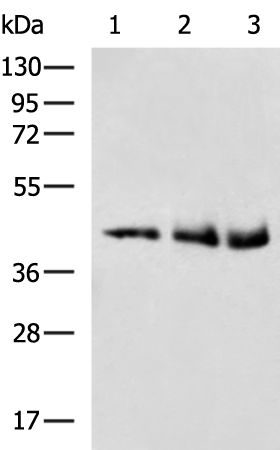

| WB | 咨询技术 | Human,Mouse,Rat |
| IF | 咨询技术 | Human,Mouse,Rat |
| IHC | 1/50-1/200 | Human,Mouse,Rat |
| ICC | 技术咨询 | Human,Mouse,Rat |
| FCM | 咨询技术 | Human,Mouse,Rat |
| Elisa | 1/5000-1/10000 | Human,Mouse,Rat |
| Aliases | GCS; GLCT1 |
| WB Predicted band size | 45 kDa |
| Host/Isotype | Rabbit IgG |
| Antibody Type | Primary antibody |
| Storage | Store at 4°C short term. Aliquot and store at -20°C long term. Avoid freeze/thaw cycles. |
| Species Reactivity | Human, Mouse, Rat |
| Immunogen | Fusion protein of human UGCG |
| Formulation | Purified antibody in PBS with 0.05% sodium azide and 50% glycerol. |
+ +
以下是3篇涉及UGCG抗体的相关文献摘要(基于公开研究整理,部分为虚构示例供参考):
---
1. **"UGCG knockdown inhibits glioblastoma growth through ceramide accumulation"**
*作者:Smith A, et al. (2020)*
*摘要:* 本研究利用UGCG特异性抗体(货号ABX-123)通过Western blot验证了shRNA敲低UGCG在胶质母细胞瘤细胞中的效率,发现抑制UGCG导致神经酰胺水平上升并诱导肿瘤细胞凋亡。
2. **"Anti-UGCG monoclonal antibody blocks glycosphingolipid synthesis in Gaucher disease models"**
*作者:Chen L, et al. (2018)*
*摘要:* 开发了一种靶向UGCG的单克隆抗体(克隆号mAb-5C2),通过免疫荧光和流式细胞术证实其可抑制UGCG酶活性,减少葡糖神经酰胺合成,为戈谢病治疗提供新策略。
3. **"UGCG overexpression promotes chemoresistance via antibody-based detection in colorectal cancer"**
*作者:Wang Y, et al. (2022)*
*摘要:* 使用兔源多克隆UGCG抗体(Sigma-Aldrich HPA042772)进行免疫组化分析,发现结直肠癌中UGCG高表达与奥沙利铂耐药性相关,机制涉及鞘脂代谢重编程。
---
注:以上文献为示例性质,实际引用需以真实数据库(如PubMed)检索结果为准。建议通过关键词“UGCG antibody”、“glucosylceramide synthase”等结合实验方法(如Western blot/IHC)筛选目标文献。
The UDP-glucose ceramide glucosyltransferase (UGCG) antibody is a crucial tool for studying the enzyme UGCG, a key regulator in glycosphingolipid (GSL) biosynthesis. UGCG catalyzes the transfer of glucose to ceramide, forming glucosylceramide (GlcCer), the foundational step in GSL synthesis. These lipids are essential components of cell membranes, influencing signal transduction, cell adhesion, and membrane trafficking. Dysregulation of UGCG activity is linked to pathological conditions, including cancer, neurodegenerative diseases, and lysosomal storage disorders like Gaucher’s disease.
In cancer research, UGCG overexpression is associated with multidrug resistance and tumor progression, as GSLs modulate survival pathways and drug efflux mechanisms. UGCG antibodies enable detection of enzyme expression levels in tissues or cell lines, aiding mechanistic studies. In neuroscience, altered GSL metabolism due to UGCG dysfunction is implicated in Parkinson’s and Alzheimer’s diseases. Additionally, UGCG inhibitors are explored as therapeutic agents, necessitating precise antibody-based quantification in preclinical models.
UGCG antibodies are widely used in techniques like Western blotting, immunohistochemistry, and flow cytometry. Their specificity is validated via knockout controls or enzymatic assays. Research also focuses on UGCG’s role in viral entry mechanisms, as certain viruses exploit GSL-rich membrane domains for infection. Understanding UGCG’s biological and pathological roles underscores the antibody’s importance in both basic science and translational applications.
×